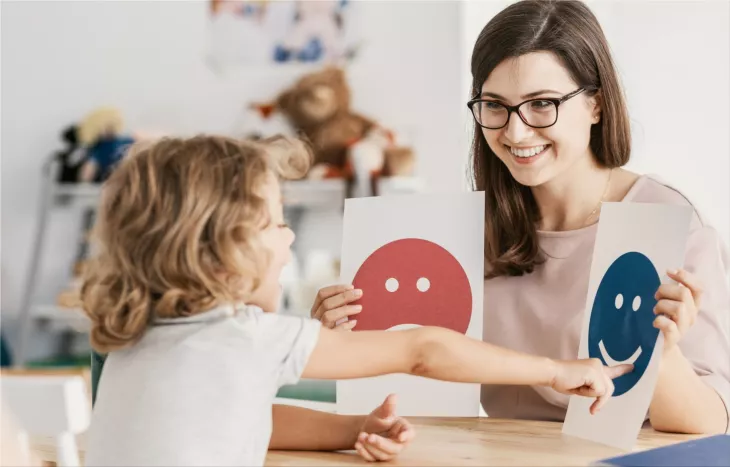Today's kids are the most intelligent and most driven ever. But many of them are also the most lonely, stressed, risk-averse, and depressed kids in the world. Before the pandemic made many of our young people's mental health worse, that was the way it was.
Even though some kids can still thrive, they do not do well in school because some kids have bad genes, low GPAs, or play certain sports or instruments. However, they have things that help them be healthy, happy, and resilient. But, of course, those skills have to be taught. And a single chat or some other time is not going to help. But, in the best lessons, they are trained and grown organically and often. Read on for essential traits that science says will help kids be more resilient and some tips for parents on how to teach them.
1. Self-Assuredness: Thrivers Understand Who They Are.
Self-confidence, a quiet sense of "who I am," helps build inner confidence and appreciation for one's unique strengths, interests, and qualities. It also serves as a child's customized road map to top performance. Self-confidence aids kids in navigating life, staying the course, bouncing back from setbacks, and having the inner resources they need to deal with adversity.
Tips for Helping Children Build Self-Esteem
Discover who your child is. Please make a list of a few legitimate strengths that you want your child to see in himself. Do this, so your child knows what he did to deserve praise. Carve out time for your child to learn these skills: Some people can hide there when things fall apart.
When talking to people, people should concentrate on their strengths, not their flaws. These questions can be used to help your child figure out what they are good at.
People ask:
- "Which subject or activity did you like the most?"
- "What did you want to do?"
- "What was the best (easiest, hardest) thing that happened to you?"
- "What did you find out about yourself?"
- "What did you do to improve?"
- "What do you want to do again?"
Kids should be in charge. Take small backward steps so your child can pull you in the direction he wants.
We become more confident when we do things well. But many parents overschedule their kids, thinking that we are making their lives better. As a result, we help the kids with things they should do independently. This kind of "helicopter parenting" can hurt a child's sense of self-worth. It takes away the chance to learn new skills. Simple things like making doctor appointments help kids learn how far they can go independently. They begin to feel more okay about themselves and start to believe in themselves.
2. Compassion: Thrivers Consider "We" Rather Than "Me."
Empathy is not soft and fluffy: It affects our kids' health, wealth, real happiness, and relationship satisfaction and helps them be more resilient when things go wrong. Trying to raise "successful" kids without empathy makes them less likely to thrive and more likely to be lonely and empty, making them feel depleted. Thrivers need social skills and healthy relationships to get over setbacks and move forward.
Tips on how to teach empathy
Help them name their feelings. Kids need to be able to talk about how they feel with other people, so say things like, "You are happy, angry, or sad." Then, ask, "How do you feel?" over and over again until you can ask, "How does she/he/they feel?"
Give people chances to be kind. Find ways to encourage your child to be kind regularly. The same way you show your kids you care about their studies and sports, show them that you care about good behavior.
Their circle of concern should grow to understand someone else's problems more quickly because we share many of the same qualities as them: our race or gender, our culture, our age, or our income. To help your child develop empathy, make sure that they have a lot of friends and family.
Many parents try to "grow empathy." It is not enough for parents to show their kids how to do good deeds to make them strong. When you help out with a project, it is just one moment in time. A better way to deal with this is to let kids grow their circle of friends and naturally form relationships with people who have different life situations. If they do this, they will better understand what others are going through and be more likely to show compassion.
3. Self-control: Thrivers know how to control their impulses.
Self-control is the capacity to restrain your attention, emotions, thoughts, actions, and desires is one of the most critical skills for success. It is also a secret that many people do not know about to help kids bounce back and thrive. As self-control goes down, stress rises, and kids' abilities to focus, delay temptations, and control their behavior go down. Before you start working on your child's self-control, think a lot about how you act. How do you operate in front of your kids when you can not keep your emotions in check? We show our kids how to do things. Model what you want your child to learn.
Tips on How to Teach Self-Control
Help them see signs of stress. It would help if you pointed out your child's stress signs until she can figure out what they are. Your hands are clenched. "Your teeth are getting worn down." "Your feet are shaking."
Teach them 1-2 breaths. First, a slow, deep breath is taken in, and then the person exhales for twice the length of time they took to breathe in. This helps the brain get more oxygen.
Teach them to say positive things. Words that make you happy (like "I have got this!") Breathe! Carry on." You can give your child a range of words and help them choose one until it is natural.
Children today live in a more stressful world than in the past, making it easier for them to break down. It is probably more difficult for them to learn self-control than for us to do the same thing. But when we try to make excuses for their behavior by saying, "They have a lot going on," or even worse, take them out of stressful situations, we do not help them in the long run. They need to learn how to use the tools for self-control to thrive in a stressful world like today.
4. Thrivers have strong solid morals and know what they stand for.
Kids need to have integrity because they are honest with themselves and other people. They are also tenacious, responsible, courageous, and resilient. When we are not around, our kids need this fourth strength to set boundaries, resist temptation, and teach them how to act right even when we are not there. Integrity is not made up of DNA or a high GPA. It is made up of learned beliefs, skills, and attitudes that help kids become their best and thrive, which we need in our cruel, me-first world.
Tips on how to teach integrity
When your child shows integrity, praise them. Make sure your child knows what he did that deserves praise, so he will be more likely to do it again.
Use mantras that have good things in them. "Honesty is the best policy" is good to look for. People say, "Always be kind." "Speak the truth." It would be best if you kept repeating and explaining the one phrase in context until your kids can use it on their own and not need you to show them how.
Find a reason that is "kid-friendly." If the knowledge is developed correctly and is meaningful, it can help you become more honest. For example, your child might be interested in volunteering at a soup kitchen or playing games with kids at a shelter. Find a project that fits your child's interests.
Integrity is one of the hardest things to teach your child because few other parents do it. This might make it seem like your child is getting a raw deal because not many other parents are. However, it is a big problem for adults not to have enough integrity, so do not be surprised if your kids do not like it when you teach them how to be honest.
5: Thrivers are always curious about new things, so they think outside the box.
Curiosity helps children develop solutions, challenges them to look into different ideas, and encourages them to follow their passions. It also makes them ask, "What else can I learn today?" It also helps kids think of ways to solve their problems and develop new methods to "pick themselves up and start all over again." Curiosity helps our kids be ready for an uncertain 21st century. It also helps them be successful both in and out of the classroom, and it must be taught.
Tips for Getting Kids to Be Curious
Play with toys and games that can be used in many ways. Creative kids love things where they can let their imaginations run wild and do not have to think about what the "right" answer should be.
Stretch your curiosity. This is not the way to say, "That will not work." How do you know that? "How do you find out?"
Allow time for yourself. Creative kids need a lot of time to think. Your child's schedule is essential, so keep an eye on it. Ensure there is time for you and your child to be alone without technology. You might have to help your child learn to enjoy being alone. Most thrivers have hobbies they use to help them relax.
Kids today are not as interested in things because we have so much access to technology. Now that they can search for any topic right away, they are less likely to wonder about things that interest them. Instead, their minds are filled with social media and other "noise." Reclaiming their curiosity gives them the courage to try new ideas, take risks, and come up with new ideas.
6. Thrivers keep going even when they do not get any gold stars or trophies.
In many cases, the strength of perseverance is what makes the difference between whether or not a child succeeds or fails. Children can use this strength to stay on track, get closer to their dreams, and help them thrive. The proper lessons can stretch and improve this strength. We need to teach this sixth parenting skill because it is vital for us too.
Tips on How to Teach Perseverance
"Mistakes are bad" should be taken out. To succeed, you need to figure out how to learn from your mistakes, so you do not make the same mistake again. Check your test and see how to fix it.
Change the word "success" to "gain." For example, "Monday, you got two words right; today, you got five!" That is a WIN! "Last week, you hit one run. This week, you hit two." That is a WIN!
Grow a growth mindset. Your child's effort, not the finished product, is what you should be praising. This helps kids understand that success is not a trait in their DNA but comes with hard work and practice.
The way we live now is a series of short-term jobs and projects. People even work in the gig economy, and we can see that this is true. People are no longer encouraged to keep up with anything they do not like or work hard to master something. No wonder our kids are so willing to give up. All of this is stopped by teaching perseverance. It encourages determination and the strength to get back up.
7. The silver lining is always there for people who win.
Optimistic kids think that problems and obstacles are short-term and can be overcome, so they are more likely to keep going and succeed even when they face many problems. On the other hand, people who think negative thoughts without any evidence are less resilient, less able to achieve, and less hopeful. But you can learn how to be optimistic, and it can help.
Tips on How to Teach Optimism
Keep your pessimism in check, and do not be too down. Our negative thoughts and fears can make our kids less positive about life. This can make them less likely to be happy. Be the person your kids want to follow.
Good news should be spread. In newspapers, on the Internet, or in your neighborhood, look for stories about good people who are not famous. This will aid your junior focus on the good. They can be talked about at family dinners or texted to each other to make them more attractive.
A positive motto can help you. Help your kid come up with a mantra like "I have got this," "I can do it," or "I can handle it to fight off evil thoughts. Make it easy to remember and sticky.
It is common for people to be pessimistic. A lot of people like cynicism because it looks fantastic. There is bad news coming at them all the time. Plus, kids can easily compare themselves unfavorably to other people because of social media, which makes it easy for them to do. To stay optimistic in the face of uncertainty, you need to be healthy. There can not be any strength without it.
It is hard for kids to succeed in a technologically driven, afraid, rapidly changing world in the 21st century. Yet, they need the strength of heart, mind, and will to succeed. To help kids deal with life's bumps and live successfully fulfilled lives, we need to teach them the seven essential character strengths. Developing them may be the best thing we can do for our kids because they will be better able to deal with problems and be more likely to have meaningful lives without us.


























